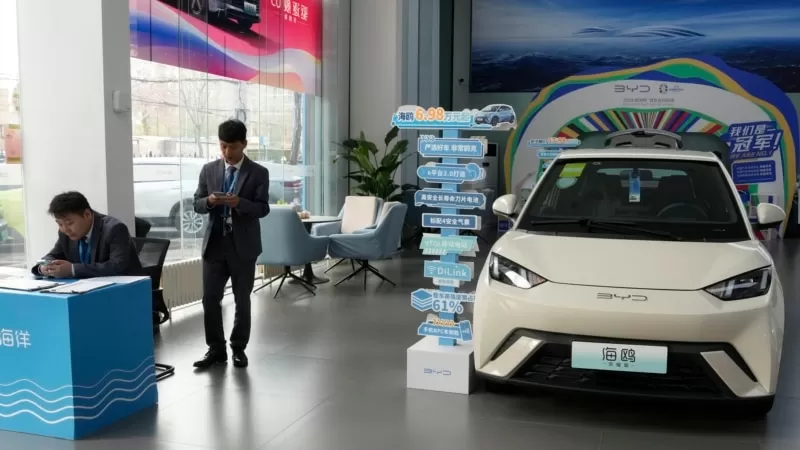In a bold move to revive domestic manufacturing, President Joe Biden announced on Tuesday that he will be imposing a significant increase in tariffs on Chinese electric vehicles, as well as new levies on computer chips, solar cells, and lithium-ion batteries. This decision comes as part of the administration’s efforts to level the playing field for American automakers and workers, who have long been struggling to compete with China’s unfair trade practices and subsidies.
Under the new tariffs, Chinese electric vehicles, also known as EVs, will face a quadrupled rate of 100%. Solar cell and semiconductor imports from China will be subject to a 50% tariff, double the current rate, while certain steel and aluminum imports will see a rate increase of 25%, more than triple the current level. These tariffs will cover a total of $18 billion in Chinese products, with the rates taking effect this year for EVs, steel, and aluminum, and next year for chips.
United States Trade Representative Katherine Tai stated that the administration has provided pre-notification to Beijing, emphasizing that this move is not about escalation but rather the consequences of decades of unfair economic policies. “We have made it clear that this is about defending our rights and addressing China’s unfair practices and subsidies,” she said.
The decision to increase tariffs is aimed at offsetting China’s control of the majority of global production for critical inputs, such as EVs, and their use of forced technology transfers and intellectual property theft. These actions have not only created unacceptable risks to America’s supply chains and economic security but have also hindered fair competition for American companies.
In response to the U.S. announcement, China expressed its disappointment, stating that the move “will seriously affect the atmosphere of bilateral cooperation.” Foreign Ministry spokesperson Wang Wenbin accused the U.S. of using the “overcapacity” narrative to practice protectionism and trample on market principles and international trade rules.
This decision by the Biden administration follows a three-year review of the policies of his predecessor, Donald Trump, who has also been vocal about being tough on China. Both candidates have used their campaign events to compete in showing who is tougher on China ahead of the November election. Biden criticized Trump for failing to increase American exports and boost manufacturing, while Trump claimed that the new tariffs will not be enough to compete against Beijing and called for more tariffs on other products.
However, the Trump campaign’s response to Biden’s decision was not positive, with press secretary Karoline Leavitt calling it a “weak and futile attempt to distract from the grievous harm his insane Electric Vehicle mandate is doing to the U.S. auto industry.” She also accused Biden of pushing his agenda of killing gas-powered automobiles and forcing Americans into expensive electric vehicles they do not want or can afford.
In response to such criticism, Tai stated that the tariffs are not emotional but rather strategic and effective. The administration is trying to preempt potential future increases in Chinese EV imports, as the U.S. currently imports almost none from China. This move is part of a larger policy initiative to ensure that Chinese companies do not benefit from U.S. government subsidies, as seen in Biden’s climate and energy legislation and legislation to boost domestic semiconductor research and manufacturing.
However, this decision is likely to increase friction between the world’s two largest economies and is not expected to change Beijing’s behavior. China has stated that it will take all necessary measures to defend its legitimate rights and interests, opposing unilateral tariffs that violate WTO rules.
Biden reiterated that he wants fair competition with China, not conflict, and believes that the U.S. is in a stronger position to win due to the investments his administration has made to revive domestic manufacturing. According to a 2022 report by the Center for Strategic and International Studies, China spends more on industrial policy than it does on defense, and more than twice as much as the U.S. This shows the extent to which China supports its industries and the need for the U.S. to take action to level the playing field.
On the same day that Biden announced the new tariffs, Chinese automaker BYD, the world’s largest electric vehicle producer, unveiled its midsize hybrid-electric pickup truck, the Shark, in Mexico. This move is seen as an attempt to circumvent the tariffs by producing EVs in a U.S. free trade partner country, as they would then qualify for tariff-free entry into the U.S. market under the 2020 United States-Mexico-Canada Agreement (US


